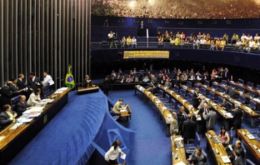MercoPress. South Atlantic News Agency
Stories for December 27th 2011
-
Tuesday, December 27th 2011 - 13:57 UTC
Argentine Media bill: “a dictatorship couldn’t have done it better”

The conservative and influential Brazilian newspaper O Estado de Sao Paulo in an editorial described the Argentine government as an “austral democradura” (authoritarian regime) which is sponsoring legislation “to terrorize the media”.
-
Tuesday, December 27th 2011 - 13:56 UTC
Brazil votes 2012 budget limiting civil servants salaries and pension increases

The Brazilian Congress approved next year's budget bill, rejecting wage increases for pensioners and public servants in a bid to contain spending as volatility advances in international markets.
-
Tuesday, December 27th 2011 - 13:54 UTC
Rousseff reiterates pledge to eliminate extreme poverty in Brazil by 2014

President Dilma Rousseff, about to complete her first year in office, reiterated she remains committed to eliminate extreme poverty in Brazil by the end of her term in 2013.
-
Tuesday, December 27th 2011 - 13:53 UTC
Argentine human rights reference openly criticizes the Anti-Terrorism law

The president of Argentina’s Grandmothers of the Plaza de Mayo organization, Estela de Carlotto, has joined Justice Raúl Zaffaroni and other sectors from the country in criticizing the recently passed Anti-terrorism Law.
-
Tuesday, December 27th 2011 - 13:52 UTC
Cuba advances with capitalist reforms to install efficient market economy

Cuba will open up more of the country's retail services to the private sector next year, allowing Cubans to operate various services such as appliance and watch repair, and locksmith and carpentry shops, official media reported on Monday.
-
Tuesday, December 27th 2011 - 09:43 UTC
How US campaigns and elections shaped politics across the world

* By Andrew Hammond - The eyes of much of North America and South America will this coming year be on the US presidential and congressional elections as Democrats and Republicans fight it out for control of the White House, the US House of Representatives, and the US Senate. The ballots could have key implications not just for US domestic issues, but also US foreign policy across the Americas region, including in Cuba and Venezuela.
-
Tuesday, December 27th 2011 - 07:04 UTC
Chile confirms it supports Mercosur resolution barring Falklands’ flagged vessels

Chilean government Secretary General Andres Chadwick denied on Monday any official message from Britain or from Spain regarding Chilean support for the resolution that bars vessels flying the Malvinas flag from Mercosur ports, reports La Tercera from Santiago.
